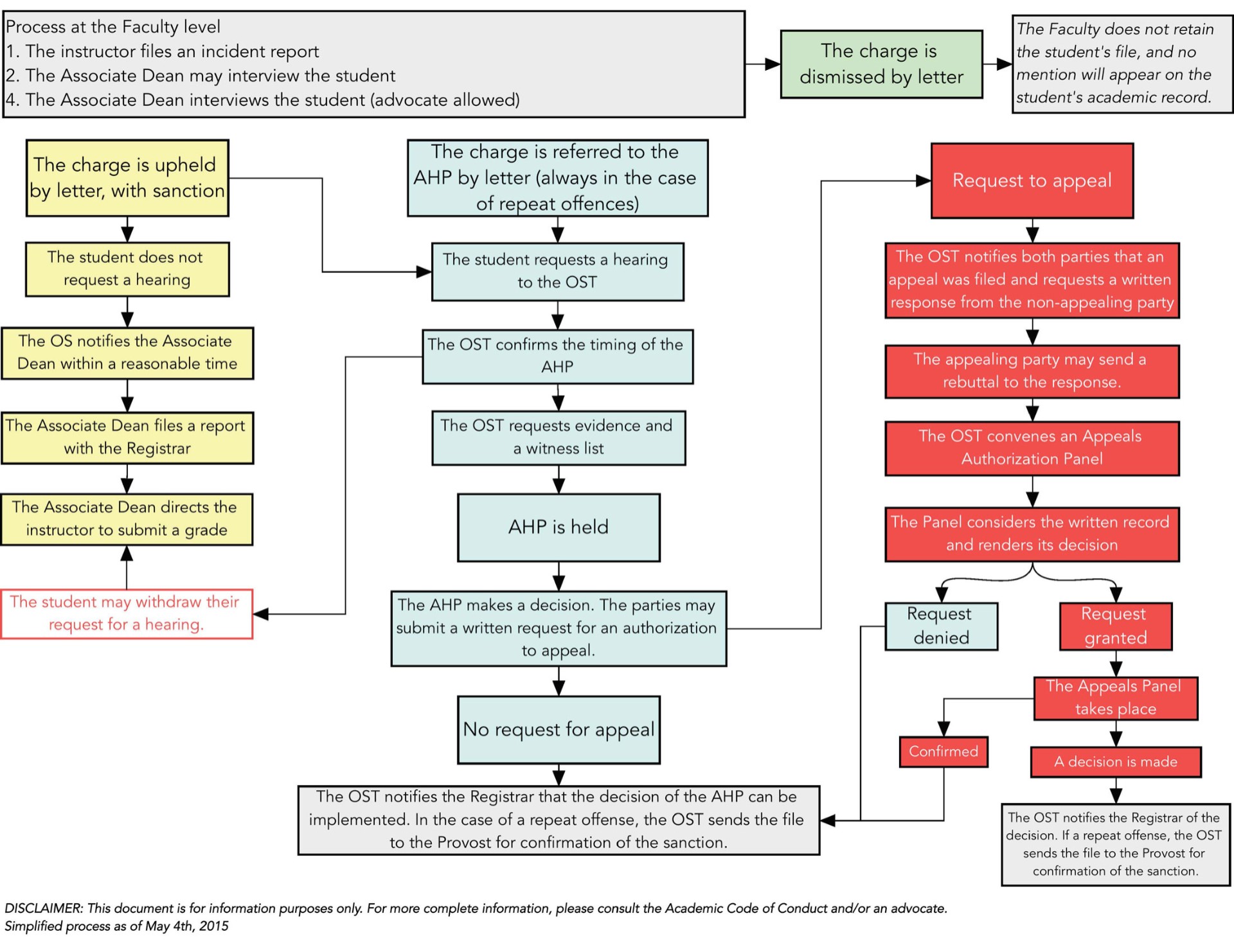DISCIPLINARY PROCESS
There is an established procedure that will be followed if you have been charged with academic misconduct.
The first thing that will happen if you've been charged with academic misconduct is that you will receive a package containing a Notification of the charge against you, as well as an incident report. The package will be sent to you by mail and/or email, so it's important that you keep your address information up-to-date with the university.
An incident report may be filed by a course instructor, by an invigilator during a centrally supervised exam, or by other individuals. Incident reports normally outline certain relevant facts surrounding an accusation of academic misconduct. If you receive an incident report, you may be invited to an interview to discuss the charge. It is important for you to confirm the date and time of the interview as requested in the letter.
In preparation for your interview, you may meet with a student advocate at the Student Advocacy Office, the CSU Advocacy Centre, or the GSA Advocacy Centre. Your advocate will discuss the facts of your case with you and be able to answer any question you may have about the process. They will also prepare you for the kinds of questions you will likely be asked at your interview. Your advocate can also accompany you to the interview.
During the interview, you will be asked questions about the incident. The interview is an opportunity for you to share your side of the story, so an informed decision may be made with respect to your case. The interviewer will use your answers, along with the incident report and any other relevant information that he/she may have, to render a final decision about your case. While it is recommended that you attend the interview with an advocate, you may also choose to attend alone. After the interview, a decision will be rendered on your case in approximately 10 working days. You will receive the decision letter by mail and/or email.
If it has been decided that there has been no violation of the Academic Code of Conduct, the case will be dismissed. This means that there will be no sanction imposed for the charge, no record of the incident on your student record, and your Faculty will not retain any records related to the incident.
If it has been decided that there was a violation of the Academic Code of Conduct, the charge will be upheld. If this is your first offense, and the case is not referred directly before an Academic Hearing Panel, one or more of the sanctions listed in the Academic Code of Conduct will be imposed. Possible sanctions include, among others:
- A reprimand.
- A grade reduction.
- Failure of the work in question.
- Failure of the course.
- Imposition of up to 24 credits to be added to your program requirements.
A complete list of sanctions can be found under articles 21 and 22 of the Academic Code of Conduct. In case of a first office: if a sanction is imposed by a decision letter, no matter the sanction, no notation of academic misconduct will appear of your official transcript. A notation of academic misconduct will appear on your student record. View your unofficial transcript online. You can also access your transcript by logging in to the Student Hub and going to My CU Account.
If you have previously had a charge upheld against you under the Academic Code of Conduct in the past, and your second charge is also upheld, your case will be referred directly to an Academic Hearing Panel without any sanction being imposed.
At this point, if your case was not sent to the Academic Hearing Panel: your grade will be updated, along with the appropriate notation on your student record. This whole process from start to finish can take upwards of six weeks. It is important to note that a grade obtained following an academic misconduct sanction cannot be replaced by repeating the course.
If your file was sent directly to an Academic Hearing Panel, please see the Academic Hearing Panel tab for further information.
Contesting the decision
If you want to contest the decision you must send an email requesting a hearing before an Academic Hearing Panel to the Office of Student Tribunals within 10 working days following the date of transmission of the decision. For more information on the Academic Hearing Panel process, please see the Academic Hearing Panel tab.
If you don't want to contest the decision, there is nothing further that you need to do. In that case, the Office of Student Tribunals will notify the Faculty within a reasonable amount of time following the emission of your decision letter that you decided not to request a hearing. If you need to speed up this process, for example because you are graduating, please contact the Office of Student Tribunals. The Faculty will then file a report with the Registrar and direct the instructor to submit a grade for the course, taking into account whatever sanction was imposed.
When the Secretary of tribunals at the Office of Student Tribunals receives a request for a hearing, she will send you an email informing you of the approximate time in which your hearing is expected to be held. Please note that no hearings are held in July, August and during final exams.
For full details of the procedure of the Academic Hearing Panel, please consult the Office of Student Tribunals webpage.


